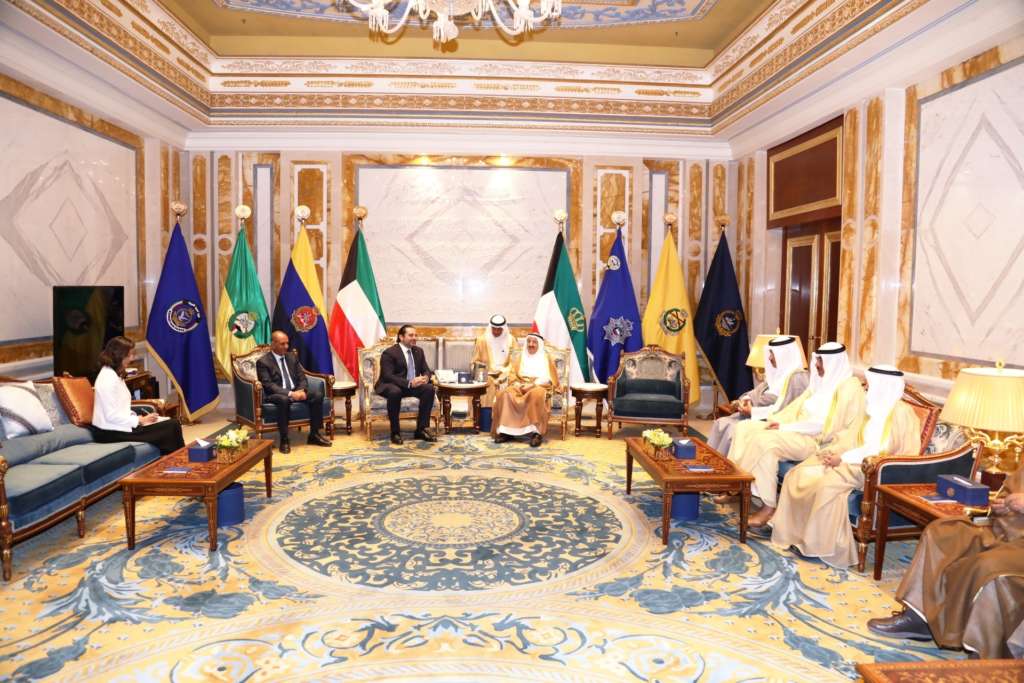Kuwait– Emir of Kuwait Sheikh Sabah al-Ahmad al- Jaber al-Sabah received visiting Lebanese Prime Minister Saad Hariri and his accompanying delegation.
Hariri visited Kuwait following reports linking “Hezbollah” with the terrorist “Abdali” cell.
It seems Kuwaiti-Lebanese relations have been improving since the arrest of the 13 terrorist, to which a top level Kuwaiti official said that ties between the two countries will not be affected by this crisis.
Sheikh Sabah and Hariri discussed during their talks ways of promoting and developing the historic relations in all fields, and several issues of mutual interest.
Several Lebanese media outlets reported that First Deputy Premier and Foreign Minister Sheikh Sabah al-Khaled al-Hamad al-Sabah informed the media delegation accompanying Hariri that Kuwait has evidence linking Hezbollah to the Abdali cell.
“We have confessions of members admitting their ties with Hezbollah,” Sabah said, adding that Kuwait will present the confessions as an evidence.
He held a lunch banquet in the honor of the Lebanese PM and accompanying delegation. Sheikh Sabah al-Khaled reported the Emir and the Prime Minister’s emphasis that relations with Lebanon were not affected by these issues but stressed the necessity of working together to reinforce the security of both countries and develop ties at all levels.
“We in Kuwait will continue to support our brothers in Lebanon,” he confirmed.
Speaking to reporters, Hariri hoped relations with Kuwait will improve.
“The state and the government are against any security breach because we consider the security of Kuwait and Lebanon as one and we do not allow any breach,” Hariri added.
When asked if there will be any measures against Lebanon, Hariri hoped not but stated that the issue must be addressed clearly and boldly because it is the duty of the state and government.
Hariri confirmed that they agreed on solving this issue in a manner that preserves relations between the two countries by all means.
Kuwait lodged a complaint with Lebanese authorities over evidence that point to Hezbollah’s involvement with al-Abdali, saying it was done “bearing the best interest of both nations in mind.”
Kuwaiti officials have requested their Lebanese counterparts to keep them informed on measures taken to fend off any actions and practices that undermine Kuwait’s security and stability.
Kuwaiti Ambassador to Lebanon Abdallah al-Qinai stated that Kuwait called on Lebanon to take “the necessary measures to curb these disgraceful practices” by Hezbollah as it is a partner in the government.
In related news, Kuwait’s Ministry of Interior announced on Sunday that security forces had arrested the 13th “al-Abdali” cell suspect.
Kuwait News Agency (KUNA) reported that the ministry released a statement detailing the arrest of Mustafa Abdulnabi Ali Bader Khan, a Kuwaiti citizen sentenced to ten years in prison.
Security forces will continue their search to capture two more Kuwaiti convicts at large, and an Iranian individual.
Members of the Abdali cell are accused of providing intelligence to Iran and Hezbollah, as well as housing weapons, ammunition and communication devices.
MoI confirmed that it will continue its extensive search until all convicts have been brought to justice.
On Saturday, the ministry announced it had captured in different parts of the country 12 of the 14 wanted convicts.
The case had created a political crisis with Iran as the Kuwaiti Foreign Ministry announced the reduction of Iranian diplomatic representation and shutting down the military, cultural and trade missions of the Iranian embassy over Tehran’s support of the “terrorist cell”.
The case emerged on August 13, 2015, when the MoI uncovered a terrorist cell with a large cache of arms, ammunition and explosives hidden underground at a farm in Abdali area on the border with Iraq. Among the explosives were hand grenades, guns, RPGs and 144 kg of bomb-making material.
On September 1, 2015, Kuwait’s public prosecution said 26 defendants, including one Iranian, would stand trial for the possession of weapons, ammunition and explosives and espionage for Iran and Hezbollah.
On January 12, 2016, the Criminal Court sentenced a Kuwaiti man and an Iranian, Abdulreza Haidar Dahqani, to death, one defendant to life in prison and 19 others to between five and 15 years in jail.
The verdicts were appealed on July 21, when the Court of Appeals upheld the death sentence against the Kuwaiti national, one life sentence and one five-year sentence. Nine men who had been sentenced to 15 years in prison, were acquitted. The court also reduced three 15-year sentences to between two and five years, one 10-year sentence to five years, and two 15-year sentences and two five-year sentences to fines of 5,000 Kuwaiti dinars.
